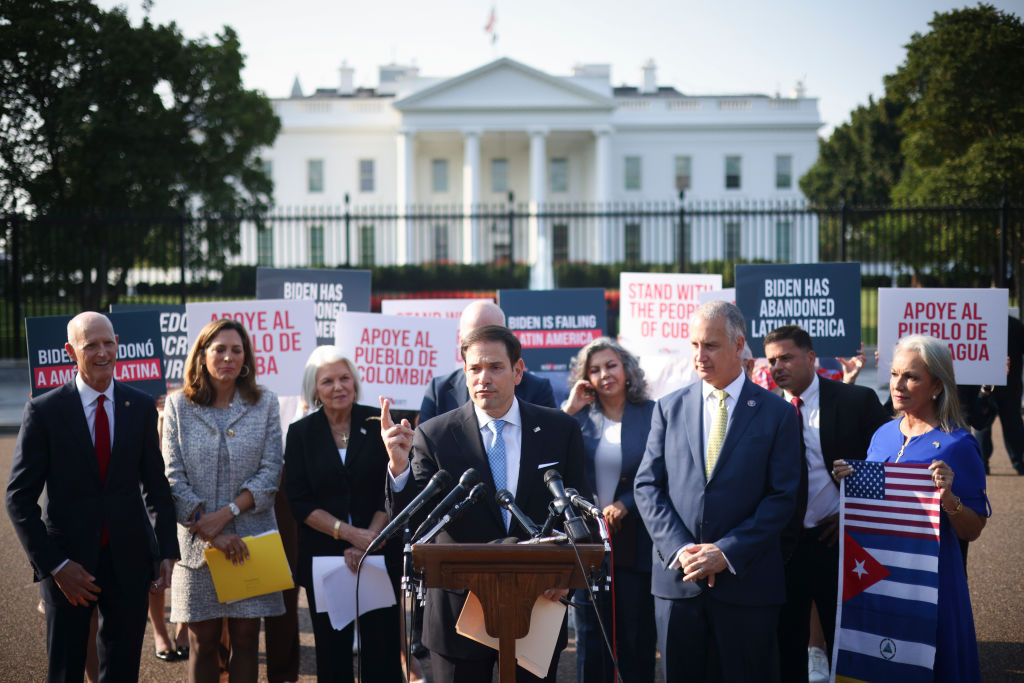The Case for Engagement With Venezuela
Maximum Pressure Will Only Strengthen Maduro
Foreign Affairs, November 28, 2024
Among the most complex foreign policy challenges facing the new U.S. administration is the situation in Venezuela. Over the past 12 years, Venezuela has transitioned from a fragile democracy to an entrenched authoritarian regime, experiencing one of the most severe economic collapses and migration crises in modern history outside wartime. And in recent years, these problems have increasingly affected the United States. During the past five years, U.S. authorities have apprehended more than 900,000 Venezuelans attempting to cross the southern border.
[Lea la versión de este artículo en español aquí.]
Many expect that Donald Trump’s presidency will mean the return of the maximum-pressure approach to Venezuela that defined his first term, when Washington imposed sweeping oil and financial sanctions, backed efforts at an armed uprising, and even floated the possibility of direct military action. At a rally in Florida just three days before the election, Senator Marco Rubio, Trump’s nominee for secretary of state, asserted that under the new administration, “we will have a very different position, much tougher and much clearer, not only in Venezuela, but also in Cuba and Nicaragua.” Rubio has cosponsored legislation to codify sanctions on Venezuela, conditioning any sanctions relief and diplomatic recognition on Venezuelan President Nicolás Maduro relinquishing power and an opposition-led transition.
But a return to the failed strategy of maximum pressure by the new administration would be a grave mistake. Sanctions are rarely effective in achieving regime change, and Venezuela is no exception. Far from destabilizing Maduro, U.S. sanctions have helped him consolidate control, increasing the asymmetry of power between the state’s apparatus and an impoverished and weakened civil society. More than seven million Venezuelans have fled the country since 2014, and doubling down on pressure could further worsen the living conditions of those remaining. Maximum pressure will, therefore, cut against Washington’s effort to reduce irregular migration and ensure a stable energy supply.
The United States should continue to condemn Maduro’s authoritarian government for its human rights violations and dismantling of democratic institutions. But Trump and his administration should adopt a strategy of targeted engagement with Venezuela’s authorities. Such a strategy would prioritize maintaining or strengthening economic and diplomatic linkages between the United States and Venezuela—the types of connections that can empower stakeholders committed to fostering a democratic transition. The first priority of U.S. policy should be to alleviate the suffering of Venezuelans, recognizing that broad economic sanctions have exacerbated that suffering. Where possible, Washington should leverage engagement—including the gradual easing of sanctions—to encourage improvements in human rights and political freedoms. This strategy of targeted engagement offers a path to immediately improve conditions in Venezuela while enhancing the prospects for a democratic transition in the medium to long term.
SANCTIONING CATASTROPHE
From 2017 to 2022, the United States imposed some of the harshest sanctions on Venezuela that it has levied on any country. The Trump administration halted all trade with Venezuela’s state-owned oil, gold, and banking sectors (transactions with private banks were still allowed) and blocked the national government and the oil industry from borrowing, restructuring debt, or receiving dividends from its offshore subsidiaries (like Citgo). In 2019, Washington handed control over Venezuela’s overseas assets to the U.S.-recognized opposition, led by Juan Guaidó, and blocked the country’s access to international reserve holdings, including special drawing rights in the International Monetary Fund.
The first Trump administration also imposed secondary sanctions, barring Venezuela from selling oil abroad by targeting foreign companies and vessels involved in its oil trade. Between 2019 and 2021, 47 vessels and 12 companies were sanctioned for assisting in Venezuelan oil exports. (In contrast, despite similar U.S. sanctions on Russian oil today, non-U.S. tankers can still sell Russian oil at $60 per barrel without being sanctioned themselves.)
This pressure has compounded Venezuela’s economic crisis. The country’s contraction in per capita incomes began in 2013 because of severe macroeconomic imbalances created by years of populist policies. Yet starting in 2017, sanctions significantly worsened the economy by severing Venezuela’s access to vital oil and financial markets, which led to a sharp decline in oil production. Sanctions contributed substantially to falling oil output, imports, and productivity; without them, Venezuela’s economy would have started to recover when oil prices rose in 2017. Sanctions accounted for around 52 percent of Venezuela’s economic contraction between 2012 and 2020. Without sanctions, Venezuela would have still faced a severe crisis, with per capita incomes dropping by 34 percent. With sanctions, however, GDP per capita declined by an extraordinary 71 percent—equivalent to almost three successive Great Depressions.
Venezuela’s migration crisis stems from this collapse in economic opportunities. Although the country’s human rights violations are horrific, they are not on the scale of the ethnic cleansing, genocide, or armed conflict that typically drives mass displacement. Instead, millions of Venezuelans have left to escape an economic catastrophe. If the U.S. government resumes policies that target Venezuelans’ livelihoods, it should not be surprised when many of those affected end up at its doorstep.
GAINING FROM ENGAGEMENT
In 2022, the Biden administration reestablished contact with the Maduro government, pursuing a dual track that gradually eased sanctions and encouraged renewed negotiations with the opposition. In November of that year, the U.S. Treasury issued a license for Chevron—the only U.S. oil company with production capacity in Venezuela—to export Venezuelan oil to the United States, coinciding with the resumption of talks between the Maduro government and its opposition.
Critics claimed that the Biden administration was giving Maduro sanctions relief without gaining anything in return. Yet this critique overlooks a key achievement. In October 2023, Maduro publicly committed to holding free and fair presidential elections. Though the election ended up being minimally transparent, this concession ultimately allowed the opposition coalition to register Edmundo González as a candidate after María Corina Machado, who had won the opposition’s primary in October 2023, was barred from running. Washington also successfully encouraged the opposition to abandon its failed electoral boycotts and to engage in the election process despite facing an unlevel playing field.
These decisions helped pave the way for González to defeat Maduro in the July 28 presidential election by more than a two-to-one margin. The opposition documented its victory with tally sheets from the country’s electronic voting system, reenergizing the coalition and demonstrating its broad support among Venezuelans. Although this victory did not produce immediate change, with Maduro’s electoral council blatantly altering the election’s results to declare Maduro the winner, it marked the opposition’s strongest challenge yet to Maduro’s authoritarian rule.
Critics might argue that the opposition’s electoral victory was meaningless because Maduro ultimately retained power and intensified repression. But such a critique misses the broader significance of the outcome. The elections played a crucial role in revitalizing and legitimizing Venezuela’s opposition, demonstrating its broad popular support, and strengthening its internal cohesion. These developments are essential preconditions for any successful challenge to an entrenched regime. Whether these gains can translate into meaningful change will depend on how realistic the opposition’s objectives are and how well it leverages its newfound strength in future negotiations.
BEYOND ISOLATION
A realistic foreign policy toward Venezuela must begin with the recognition that Washington has limited influence over political dynamics in authoritarian countries. In a world where 71 percent of people live under autocratic regimes, it is not only futile but also dangerous to target select countries—such as Cuba, Iran, and Venezuela—for regime change. Singling out specific regimes risks alienating allies, undermining U.S. moral authority, and reinforcing authoritarians’ claims that Washington meddles in other countries’ domestic affairs. In Venezuela, a principled, pragmatic approach—focused on humanitarian relief and diplomatic engagement—would better serve the interests of both the United States and the Venezuelan people.
Trump’s administration should thus continue easing economic sanctions. It should do so, in part, simply because the restrictions have needlessly immiserated millions. But improving the country’s living conditions also serves a political purpose. The more tolerable life becomes for Venezuelans, the less likely they are to flee to the United States. Managing migration flows from Venezuela will also require sustained communication and coordination with Caracas. Reopening the U.S. embassy in Venezuela is therefore a critical step to safeguarding American interests in the country, as well.
A return to the failed strategy of maximum pressure would be a grave mistake.
Easing sanctions could afford the Trump administration an opportunity to secure concessions on human rights. Licenses for new oil projects, for example, could be conditioned on revenues being allocated to international organizations that can address Venezuela’s humanitarian crisis. Likewise, the Trump administration could use sanctions relief to induce political reforms. It should work to secure the release of political prisoners. It should negotiate for institutional changes that reduce the stakes of power and create space for coexistence between Venezuela’s political factions. It should push Venezuela to appoint new electoral authorities and commit to inviting in international observers for upcoming elections. All three of these steps would provide vital space for electoral competition. They remain the best path to fostering a democratic transition. (The United States should also work with regional partners, including Brazil, Colombia, and Mexico, to forge a realistic political settlement.)
Should the Trump administration embrace a policy of limited engagement, it would be bowing to reality. Punitive policies may appeal to policymakers, but they often corner regimes, making behavioral change unlikely. A government whose leaders fear U.S. prosecution will do everything to remain in power, including stealing elections. Strategic engagement, on the other hand, can incentivize positive shifts and strengthen local actors who support a negotiated resolution. The political scientists Steven Levitsky and Lucan Way have shown that countries with economic, social, and institutional ties to the West are more likely to democratize than those subjected solely to punitive measures.
Likewise, Trump would be accepting that when people become poorer in an authoritarian country, the state becomes stronger, not weaker. At the height of the Venezuelan economy’s contraction, a large segment of the population depended on politically conditioned government handouts. In contrast, Venezuela’s economic recovery of the past four years, due in part to the easing of oil sanctions, has helped reduce low-income voters’ dependency on government programs, making them less susceptible to electoral blackmail.
No U.S. administration can overhaul Venezuela’s political system. But by setting achievable goals that address immediate needs, promote economic recovery, and support fundamental freedoms, the United States can help the Venezuelan people. A pragmatic approach that prioritizes economic recovery and gradual political progress will be far more effective in bringing Venezuela closer to change than a strategy of suffocation.
- FRANCISCO RODRÍGUEZ is Rice Family Professor of the Practice of International and Public Affairs at the University of Denver’s Josef Korbel School of International Studies.

